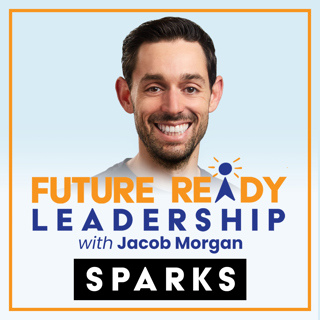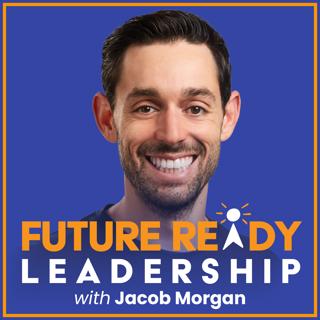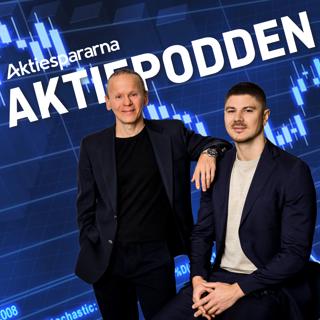
Sparks: 8 Attributes You Need to Be a Vulnerable Leader (According to Over 100 CEOs)
What makes vulnerability in leadership powerful, but also dangerous? Leaders often confuse vulnerability with simply admitting mistakes or showing emotions. But without the right foundation, being “open” can backfire, leaving you looking weak or incompetent instead of inspiring trust. In today’s Leadership Spark, the spotlight is on the eight attributes of vulnerable leaders, distilled from my conversations with over 100 global CEOs. The discussion reveals that vulnerability on its own isn’t enough. It has to be paired with strong leadership qualities. We’ll unpack the three crucial attributes leaders need, such as competence, self-confidence, and motivation. You’ll hear real-world stories from failed $150M bets to CEOs battling panic attacks that show how uncomfortable but necessary vulnerability is. ________________ Start your day with the world’s top leaders by joining thousands of others at Great Leadership on Substack. Just enter your email: https://greatleadership.substack.com/
12 Sep 14min

What Mercer’s CEO Reveals About Work Ethic, Cultural Trends, and the Future of Work
What does it really take to reach the top of an organization? Beyond the glossy titles and corner offices lies a culture of sacrifice, long hours, and relentless client demands that shape modern leadership. In this episode, we sit down with Pat Tomlinson, CEO of Mercer, to explore the realities of work culture, the growing “996” trend of long hours, and the sacrifices it takes to rise to senior leadership. Pat shares candid reflections on his own work ethic and why hard work, visibility, and flexibility remain cornerstones for career growth, particularly in professional services. From there, the conversation expands into major workplace shifts—declining birth rates, longevity risk, and the mounting pressures on healthcare and retirement systems. We also discuss the war for talent, the evolving role of employee experience and wellness programs, and the balance between organizational support and individual accountability. Finally, we explore AI’s impact on work, why productivity gains require redesigning jobs rather than bolting on technology, and the cultural challenges leaders face in adopting these tools. ________________ Start your day with the world’s top leaders by joining thousands of others at Great Leadership on Substack. Just enter your email: https://greatleadership.substack.com/
8 Sep 57min

Sparks: Humans, Not Tools: How Employee Experience Can Unlock Engagement and Bring Humanity Back to the Workplace
We often talk about employee engagement, but before that comes something deeper: experience itself. Just like we invest our own time and money into personal experiences that create lasting memories, employees evaluate their organizations through the experiences they have at work. The problem? For over a century, companies have designed work as if humans were robots—linear, rigid, process-driven, and void of humanity. From definitions of “manager” as “slave driver” to “employee” as “cog,” the very language of work reveals how broken the system has been. But times have changed. In today's Leadership Spark, we'll unpack the true meaning of experience at work and why it’s become the defining factor of the future workplace. If organizations want to attract, retain, and inspire talent, they must redesign around humanity, not utility. This episode explores why experience is the missing link between engagement and performance, and how leaders can bring humanity back to work. ________________ Start your day with the world’s top leaders by joining thousands of others at Great Leadership on Substack. Just enter your email: https://greatleadership.substack.com/
5 Sep 9min

Is The Future of Work Ready for AI? Balancing AI’s Potential and Risks with GoTo’s Chief Commercial Officer
AI is shaping the future of work, no doubt, but are organizations truly ready to harness its full potential? Beyond the hype, leaders are grappling with challenges around AI adoption, cultural resistance, and the fear of losing human judgment in the process. What do leaders need to know about balancing AI’s promise with its pitfalls? In this episode, Peter Mahoney, Chief Commercial Officer at GoTo (formerly LogMeIn), reflects on decades of technology transformation and what it reveals about today’s AI moment. We explore why AI feels both overhyped and underutilized, the gap between IT leaders and employees, and how workplace culture influences adoption. Peter highlights where AI already delivers real productivity gains—from virtual assistants enhancing customer experience to tools that accelerate workflow integration and employee training. At the same time, he warns about the risks of over-reliance, AI limitations, and the need for leaders to protect critical thinking in their organizations. You’ll gain a clear view of how leaders can use AI responsibly to innovate, protect culture, and guide the future of work. ________________ Start your day with the world’s top leaders by joining thousands of others at Great Leadership on Substack. Just enter your email: https://greatleadership.substack.com/
1 Sep 1h

Sparks: The Global Citizen Mindset: How Leaders Should Learn to Break Beyond and Expand their Borders
What if your leadership skills were truly borderless? Could you step into any culture, any team, anywhere in the world—and still thrive? That’s the challenge and opportunity of developing a Global Citizen mindset, one of the most crucial traits for leaders today. In today’s Leadership Spark, I share why the Global Citizen mindset is a non-negotiable skill for modern leaders. I tell the story of a remarkable CEO who defied cultural limitations in Morocco, built her career across multiple countries, and earned the nickname “Water Lady” for brokering a major deal between Saudi Arabia and the U.S. We explore how leading in different cultures teaches unique lessons—like patience in Japan or entrepreneurship in the U.S.—and why cultural blind spots, such as Disney’s failed “Euro Disney” launch, can sink even the strongest brands. You can’t lead a world-sized organization without a world-sized mindset. Check out what it means to build this mindset in this episode. ________________ Start your day with the world’s top leaders by joining thousands of others at Great Leadership on Substack. Just enter your email: https://greatleadership.substack.com/
29 Aug 5min

What a Skydiving Hall of Famer Can Teach Leaders About Turning Risk Into Opportunity
In business and in life, the most dangerous risk you can take is avoiding risk altogether. Whether it’s leading a team, making strategic investments, or navigating unpredictable markets, risk is always present, yet most leaders misunderstand how to harness it. In this episode, Jim McCormick, best-selling author (The First Time Manager, The Power of Risk) and founder of the Research Institute of Risk Intelligence, shares lessons from 5,590 skydives, high-stakes political decision-making, and years of advising executives on building “risk intelligent” organizations. He breaks down why people are naturally risk-averse, the two-part “Risk Equation” leaders must master, and how to balance instigators and mitigators for optimal decision-making. You’ll learn how to assess opportunities using ideal, most likely, and worst-case scenarios, implement “Possibility of Success Enhancement Measures” (POSSUMS) to improve outcomes, and set guardrails that encourage innovation without micromanagement. Jim also explores how to measure personal and team Risk Quotients, create cultures that reward constructive risk-taking—even when initiatives fail—and avoid the trap of over-relying on AI for critical decisions. ________________ Start your day with the world’s top leaders by joining thousands of others at Great Leadership on Substack. Just enter your email: https://greatleadership.substack.com/
25 Aug 52min

Sparks: Lead the Future: Why Current Workplace Models and Mindsets are Outdated and How to Change Them
The way we manage people today is built on ideas from over 100 years ago—ideas designed for factory floors, not modern workplaces. Management was originally created to enforce control, standardize behavior, and ensure compliance. Engagement, empowerment, and innovation? None of those were part of the equation. And yet, many organizations still operate with that outdated playbook, whether they admit it or not. In today’s Leadership Spark, I break down how the roots of management are still shaping the way we lead today, and why that must change. From the rigid philosophies of Frederick Taylor and Henry Fayol to the mindless “yes sir” culture revealed in David Marquet’s story as a submarine captain, we explore the dangers of blind obedience, outdated control models, and transactional leadership. You’ll also hear how even the words we use, such as manager, employee, and work still reflect an antiquated, dehumanizing view of the workplace. Things are changing, and if you want to lead the future, better start rejecting the “slave driver and cog” model now and build cultures based on trust, empowerment, and shared responsibility. ________________ Start your day with the world’s top leaders by joining thousands of others at Great Leadership on Substack. Just enter your email: https://greatleadership.substack.com/
22 Aug 10min

How to Handle Conflicts Without Losing Your Cool, Your Relationships, or Your Job
Why do we struggle with conflict even when we know it's important? In today’s polarized and high-stakes workplace, leaders are more afraid than ever to say the wrong thing or engage in tough conversations. But avoiding conflict doesn’t protect relationships, it slowly breaks them. In this episode, Bob Bordone, Senior Fellow at Harvard Law School, shares why conflict isn’t something to fear, but something to practice and turn into a tool for connection. You’ll learn how to build conflict resilience by recognizing your default conflict style (fight, flight, freeze, fawn, or fester), why avoidance is the “slow kill” of meaningful relationships, and how to approach disagreement with assertiveness and empathy. We also tackle how to know when to engage in conflict and when to let it go, handling workplace tension and generational differences, why most workplaces misunderstand psychological safety, and why grace—not censorship—is the antidote to cancel culture. This episode will show you why discomfort isn't something to run from and give you the mindset and tools to handle conflict with more clarity, confidence, and care. ________________ Start your day with the world’s top leaders by joining thousands of others at Great Leadership on Substack. Just enter your email: https://greatleadership.substack.com/
18 Aug 49min






















